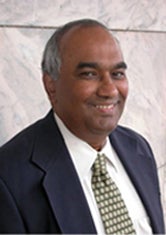Dr. Narendran is an Associate Professor in the Department of Community Dentistry and has a secondary appointment in Epidemiology and Biostatistics in the CWRU School of Medicine. In addition to his dental degree, he has a Diploma in Dental Public Health from the Royal College of Surgeons of England and a Master's in Dental Public Health from the University of London. He completed a residency in dental public health at the University of Michigan, where he also received the National Research Service Award for training in Oral Epidemiology.
Dr. Narendran has received research and teaching grants from the National Institute for Dental and Craniofacial Research, the Health Resources and Services Administration, the Centers for Disease Control and Prevention, and public and private foundations. His research focus includes oral epidemiology, oral health literacy, workforce models, and health services. He has developed three dental public health residency programs, many predoctoral and postdoctoral courses, and the Family First cornerstone experience (ACE). He has held leadership positions in the American Association of Public Health Dentistry (AAPHD) and American Dental Education Association (ADEA), and also served on the Patient Management Test Construction Committee of the National Boards for Dental Examination and is a diplomate of the American Board for Dental Public Health. Dr. Narendran’s students have won prestigious awards including: International Association for Dental Research/Colgate Prevention Research, ADEA Preventive Dentistry, AAPHD Dental Student Merit, and American Association for Dental Research/Bloc Travel Grant.
Purpose
One of the primary goals of the American Dental Association (ADA) is to, "promote the oral health of the public." Dental public health is one of the nine recognized specialties of the ADA, and is defined as, "the art and science of preventing oral diseases and promoting oral health through organized community efforts." The DMD/MPH program seeks to impart knowledge and skills necessary to expand the practice of dentistry into the community in a proactive way that fosters positive oral health, and as a direct result, yields improved overall health of the populations involved. It is necessary to address populations to improve the health of individuals and to work with individuals to improve the health of populations. Thus, dentistry and public health are inter-dependent and reliant on each other in order to achieve their mutual goals.
Description of the Curriculum
The length of the DMD/MPH dual degree curriculum is five years, one of which is dedicated to MPH courses. This year can be completed:
- before the 1st DMD year
- between the 1st and 2nd DMD years
- between the 2nd and 3rd DMD years
Other requests/options will be considered on a case-by-case basis.
DMD Curriculum: The DMD degree includes 141.5 credit hours of didactic, laboratory, and clinical work. The DMD curriculum will not entail/incur any change because of enrollment in this dual degree program. A total of 9 credits of the DMD curriculum (Epidemiology and the Sealant Cornerstone Experience) will be counted towards the MPH degree as MPH electives.
MPH Curriculum: The MPH degree requires 42 credit hours:
- 18 hours of Core Courses
- 15 hours of Electives, of which 9 are covered by DMD courses
- 9 hours of Culminating Project (3 credit Practicum & 6 credit Capstone)
- Participation in a seminar series
Students must successfully complete both the DMD curriculum and the MPH curriculum to complete the dual degree. Students must complete the Capstone project and are also expected to present their project at a national meeting, the School of Dental Medicine Professionals Day, and the CWRU MPH Population Health Innovations Conference.
The Culminating Experience is the centerpiece of the CWRU MPH Program. A Public Health field practicum and capstone project required of all MPH students, this two course sequence places students in health related settings to work on projects of mutual interest to the agency or organization and the student. The experience gives students the opportunity to apply the knowledge and skills they have acquired through their academic course work to a problem involving the health of the community. Students learn to communicate with target groups in an effective manner, to order priorities for major projects according to definable criteria, to use computers for specific applications relevant to public health, to identify ethical, social, and cultural issues relating to public health policies, research, and interventions, to identify the process by which decisions are made within the organization or agency, and to identify and coordinate the use of resources at the site.
Admissions to the Program
Students interested in the DMD/MPH program, please contact Dr. Sena Narendran, director of the program, by phone at 216.368.1311 or by email at DentalPH@case.edu.
More information
For more information about the MPH program, please visit the MPH website.


